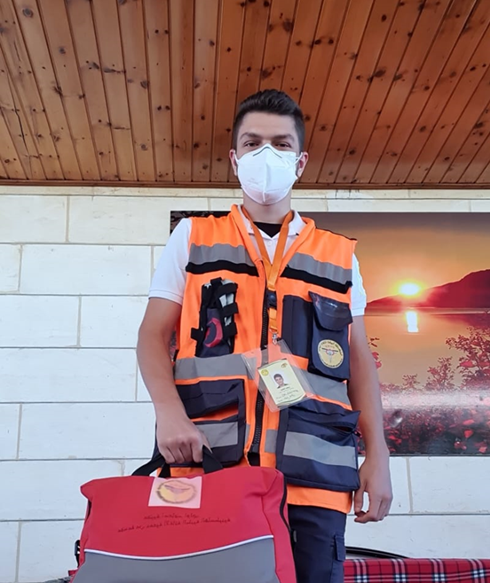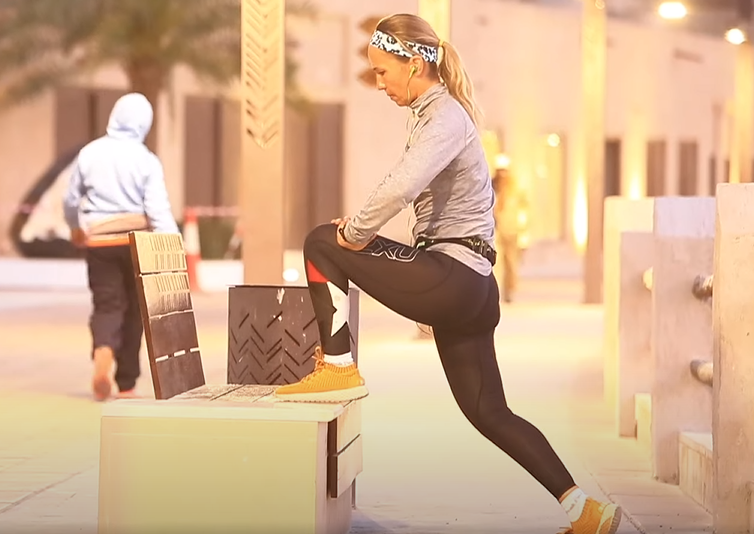The Life of an AUD Student as a Volunteer Paramedic in Palestine

Reckaz Qawasmeh at the paramedics headquarters in Hebron city, Palestine on 10/07/2021, credited to Reckaz Qawasmeh.
While most university students dream of going on vacation to discover exotic places, Palestinian Reckaz Qawasmeh would rather spend that time doing something useful for others.
The 20-year-old business student from the American University in Dubai spends his holidays in the West Bank to serve as a paramedic for the Palestinian Medical Relief Society.

He joined the Hebron-based organization as a volunteer when he says he was only 11. It was then an exception as the minimum age to volunteer is 12. Underage volunteers can normally come for the day to learn basic first-aid procedures and even get a paramedic license.
The Palestinian Medical Relief Society was founded by Mustafa Barghouti in 1979 and established its headquarters in the West Bank. The NGO has since trained more than 40,000 volunteers and has currently more than 500 workers in the West Bank, according to its website.
During a training session in the old city of Hebron when he was 13 years old, some Jewish settlers under the protection of the Israeli military broke into the paramedic’s training site. Qawasmeh still remembers that as he moved to retrieve a piece of equipment from his bag, a settler stabbed him with a knife. The wound in his underarm later required 60 stitches.
“I was surrounded by soldiers who denied me any medical help,” explained Qawasmeh. “So, I took off my shirt and training vest, placed it where I was bleeding, and tied a bandage to decrease the blood flow.”
After about an hour during which he was in and out of consciousness, the soldiers allowed him medical assistance. “My trainer had seen how I tended to myself,” he says. “So, after I was stitched up, they gave me my paramedics’ license and a hero’s welcome at the paramedics’ station.’’
Qawasmeh experienced another traumatic event in July last year when his team rushed to Bethlehem where Israeli soldiers had raided the refugee camp of Dheisheh. There, Qawasmeh accidentally slipped and was injured by a gunshot.
The work of a paramedic in the region isn’t easy, especially that according to Qawasmeh both the Israeli military and the Palestinians often block or delay medical help.
Conservative people can sometimes also obstruct the work of the paramedics. “A male paramedic cannot help a female, it’s very taboo,” he says. “I cannot provide first aid as a male, I’d have to wait for a female paramedic to come, but that isn’t possible most of the time.”
He remembers one incident during a graduation party when a woman in a car was hurt by the fireworks. “It fell in the car and burnt the girl’s hands, chest and neck,” says Qawasmeh. “I was right next to the car so I couldn’t just ignore it, but the driver was constantly yelling ‘she’s a woman you can’t touch her!’” Although Qawasmeh did not then get in trouble with the police, he says his license may have been taken away had the male driver been an influential person.
Despite all the hardships, Qawasmeh however seems to gladly embrace challenges thanks to his sense of duty. He continues to travel to Hebron for two months every year to serve as a paramedic.
His other passion in life is business. And just as his sense of duty led him to become a paramedic, he is eager to learn everything about it, especially how business can improve people’s lives. For that, he is currently studying for a Bachelor of Business Administration degree at the American University in Dubai.


